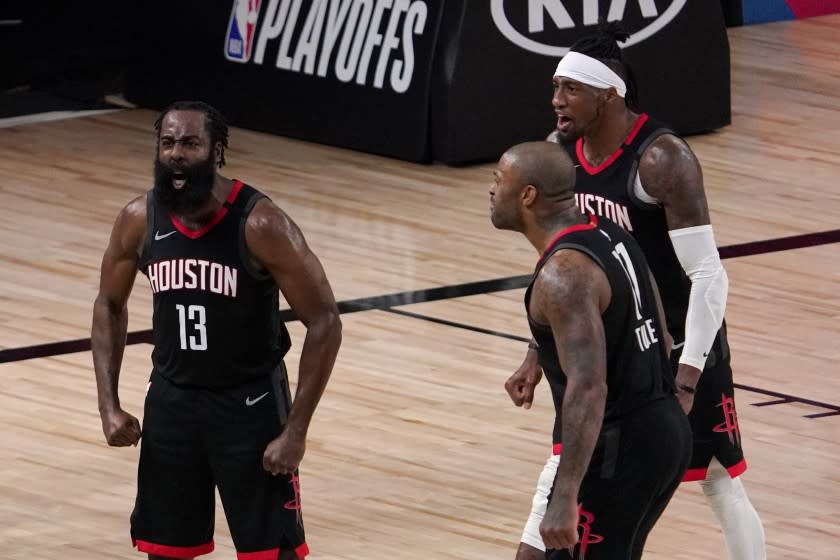Lakers must heed fragility of playoffs against Houston Rockets

As the expressionless Milwaukee Bucks answered questions, their voices never matched the frustration that must be bubbling inside.
Yeah, Mike Budenholzer thought it was a tough call. Yeah, Khris Middleton thought that there were too many mistakes. And yeah, Giannis Antetokounmpo is ready to play more if asked.
The things easiest to assume — the Bucks rolling in the East, the sure-thing MVP dominating — can be undone in three days. Don’t think so? Look at those faces. Listen to those voices. Tell me that’s how a favorite looks.
Now down 2-0 to Miami, the Bucks’ failings are a neon yellow highlighter on the biggest variable facing teams in the bubble — fragility. The entirety of the NBA’s restart can crumble at any moment, if the wrong person inhales the wrong germs at the wrong time. And the Rockets and their idea of how basketball can be played, it only lives because James Harden blocked a shot to win a series that was played to the very last possession.
These are the lessons that are there for the No. 1 seed in the opposite conference, the Lakers, who once again had to wait to the last possible minutes to find out who they’d be playing this postseason. Be prepared for anything; it’ll probably happen.
Writing off teams down 2-0 is foolish. The Bucks had Toronto on the ropes after two games in last season’s Eastern Conference finals. And the Lakers opponent in the second round this year, the Houston Rockets, needed to survive a wild Game 7 to ensure they didn’t blow a 2-0 lead too.
Despite James Harden’s awful offensive game and a final 40 seconds that looked like it was played on a freshly oiled bowling lane, the Rockets hung on, ensuring that their experiment would live on.
“That was pandemonium,” P.J. Tucker said on ESPN following the game.
A loss would mean more than the end of the season. It could’ve been the end of this era of Rockets basketball. Mike D’Antoni’s contract is set to expire at the end of the season, and he’ll have suitors. General manager Daryl Morey’s future is a question mark.
Those decisions can wait — and drastic action seems a lot less necessary after a second-round exit than it would after a loss on Wednesday.
There might not be a better example of how volatile things can be in this postseason, especially in a Game 7, than what happened Wednesday.
The plan for the Rockets was to funnel the ball to the Thunder’s undrafted rookie, to let Luguentz Dort shoot. The numbers screamed for the Rockets to do it Dort’s three-point percentage this postseason was only slightly better than Clayton Kershaw’s batting average. But in a total shock, Dort had one of the most incredible Game 7s.
His 30 points were the most by an undrafted rookie ever in a Game 7, the most by a 21-year-old in a Game 7 – more than Kobe Bryant and LeBron James did in their first Game 7s. Think about that — there’s a list with Bryant and James looking up at Luguentz Dort.
But the bubble breeds this kind of chaos, the kind that turned Denver and Utah into an all-time offensive shootout that got decided in a Game 7 that looked like a football game before the invention of the forward pass.
It gives us games like Game 2 between the Bucks and the Heat, where a bad call gives Middleton three free-throws to tie the score only to be followed by another strange whistle that sent Jimmy Butler to the line to win the game.
With no time on the clock, no fans in the building and no players standing around the key, Butler made the game-winning free throw. How 2020 is that sentence?
And those whistles? They only mattered after the Heat inexplicably coughed up the ball in the final 20 seconds to open up a door they should’ve already slammed and locked.
“It’s definitely a tough way to go out,” Middleton said of the helplessness he felt watching.
The Lakers are better than the Oklahoma City Thunder, a team that fought for six games, 47 minutes and 59 seconds before Houston put them away. James and Anthony Davis aren’t Chris Paul and an army of role players.
But weird stuff can happen. It’s been happening all around these teams, and it’ll almost certainly happen around the Lakers at some point this postseason.
The Lakers will enter the series as favorites.
They’ve got the talent, the track record and the rest. And as long as they know that this year — in these playoffs — that none of it matters — they should be just fine.

